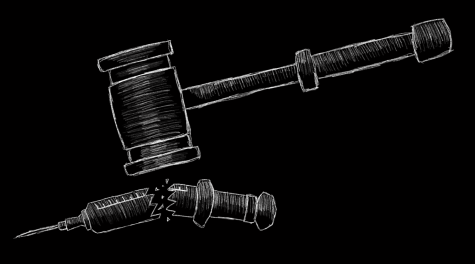Stop capital punishment now
April 14, 2022

What should we do when someone commits murder or a serious crime? How should we punish the criminal? In the United States and 53 other countries, the answer is capital punishment. However, is execution moral in the first place? What are some of the arguments made for capital punishment? I’ll personally argue that it is immoral, and all arguments made for it are dismissible.
The death penalty’s history goes back to the beginning of civilization. It has also been codified in some of the world’s major religions, such as Islam and Christianity. Historically, capital punishment has been reserved only for the most heinous crimes, such as murder, treason, large-scale drug trafficking and many more.
According to Amnesty International, at least 1477 people were executed in 2020, down from 2307 people in 2019. For example, Iran executed more than 246 people in 2020. The United States came sixth in the world, executing 17 people in 2020.
How is this moral? In my opinion, killing someone is never justifiable, even when the person has committed the worst of crimes. However, I can understand people who argue that some crimes are simply too big to be forgotten. I have found myself sometimes reading the newspaper, and thinking “man, this person deserves to die!”
But then I think whether we’d be equal to those people if we also kill them? Won’t that actually make our judges murderers? Won’t that make the people who voted for that judge murderers? As a person who believes in God, I comfort myself by thinking that justice will be served at some point.
Justice for bloodshed will not be served with more bloodshed.
Some of the arguments for the death penalty are also very persuasive. Islam, Christianity and Judaism believe in the “eye for an eye” principle. Basically, it means that you and your immediate family have the right to seek revenge for any bodily harm you’ve sustained by doing the same thing-exactly as the name suggests.
This is not something that we want to see in our justice system. We’re not a bunch of kindergarten children who kick others because they got kicked! At the same time, even though such crimes are truly unacceptable and punishable, who authorizes us to hurt someone deliberately?
Others argue that capital punishment can have a deterrent effect, bring closure to the victims’ families, or simply serve as retribution. However, more humane punishments such as life (with or without parole) can serve the same purpose.
I’d argue that life imprisonment should be considered the maximum punishment for all crimes that are punishable by the death penalty. There have been numerous cases of those who have been wrongfully sentenced to death, or their conviction is dubious at best.
A prime example is Melissa Lucio, who was sentenced to death by a court. She was reportedly “coerced to confess” to her 2-year-old daughter’s murder, even though she was innocent. She is now due to be executed on April 26.
Others argue that life imprisonment would cost the government more than capital punishment, which is actually not true. It will also prevent the death of innocent people and give the perpetrator a chance to rehabilitate and have a life. But most importantly, every single life is precious and cannot be taken away, even the life of those who have killed others.
The other problem with capital punishment is the method of execution. Hanging, firing squad and guillotine among others are some of the forms of execution used today. In the US, the primary method of execution is lethal injection.
The arguments for lethal injection state that it is the most humane method as it is quick and painless. In reality, lethal injection is anything but quick and painless. Autopsies have shown that lethal injection causes “suffocation and severe pain.”
These procedures can also easily go wrong. As no physician can and will accept to oversee the execution, it is done by non-professionals who might use the wrong dosage, causing significant pain.
Capital punishment is expensive. It is inefficient. It claims many innocent lives. It has torn families apart. It is cruel, and no method can reduce its cruelty. It is simply wrong. It is immoral, and we should be stopping it now.







Dudley Sharp • Apr 16, 2022 at 10:52 am
You were wrong, on everything, which occurs with no fact checking or vetting.
These may help:
The Death Penalty: Justice & Saving More Innocents
at prodpinnc
research, with fact checking and vetting, and with all sources provided,